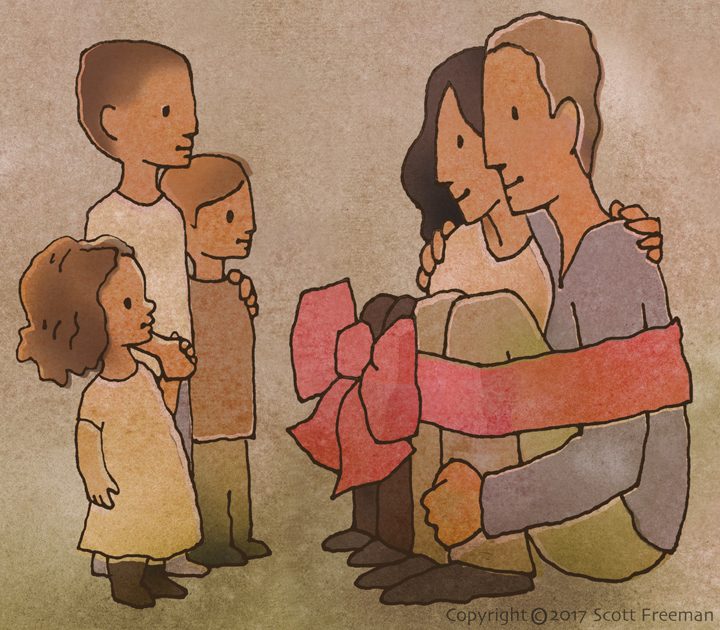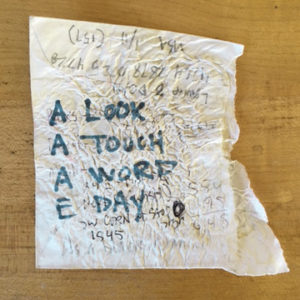
This month I’m stoked to share thoughts on a topic I’ve been mildly obsessing over for the past few months.
Recently I went to an intense and unusual men’s conference. There was almost no verbal teaching there. Instead it was very hands-on and experiential. That weekend I saw man after man experience emotional release around the issue of his relationship with his father. Some of these were mature Christian men who had been stuffing their feelings down for decades. Since then I feel I’ve been noticing the father wound issue everywhere, in friends, family, and strangers, and in seemingly every movie I see.
On the ride home from the conference, our carload of guys debriefed each other and compared our experiences for 12 hours. When I got home I wanted to learn more. I began meeting with all of my adult children to be sure I hadn’t wounded them as I had seen so many others wounded. I thought I’d share with you some encouraging thoughts that have come out of all of this.
First, it would be more correct to speak of “parent wounds” rather than “father wounds,” because it’s not only dads that mark their children through unmet relational needs. But it is true that it is more often dads who are absent, whether physically or emotionally, from the lives of their children. However, I want to hasten to add here that the point of this post is to encourage you! I would like to hold up the following vision before you:
It is not unusual in Christian circles to think of children as a gift from God. In fact, the scriptures explicitly say this (Psalm 127:3-5.) I don’t know that Mollie and I would’ve had 5 children if not for believing this. However, I think it is also true to say that we as loving parents are a gift to our children. If this was too obvious to point out in earlier generations, I would suggest that is no longer the case. As a parent I hope that you can see yourself this way. If you fulfill your parenting role well, your children will certainly grow up to see you as among the greatest of their earthly gifts. More importantly, they will enter adult life without the baggage that weighs so many people down.
What a parent wound is and is not
As I’ve talked with other dads about this, I’ve sometimes sensed some uneasiness around the topic. Perhaps this is because we are all aware that none of us are perfect parents. We all know it is inevitable that we will let down or hurt our children. But when I speak of parent wounds I am not referring to the occasional mistakes that we all make. This is not about being flawless. Furthermore, sometimes we’ll intentionally need to make decisions that will disappoint our children. But our children can understand and forgive these hurts if they occur within an overall context of love and affirmation in our family culture.
Rather, when I speak of parent wounds I’m referring to wounds that occur as a result of a regular pattern of deprivation; the withholding of good, emotionally rich relational expression from parents. If parents do not give their children a secure sense of being loved, accepted, and valued, those children will very likely seek these things elsewhere in a variety of unhealthy ways.
Since we all do make mistakes, humility is an essential part of loving, in both marriage and parenting. A parent who will admit a wrong to a child, and ask forgiveness from that child, is an amazing role model! Apparently there are a lot of people in the world who have never heard the words, “I was wrong” from a parent.
What was your “normal” as you were growing up?
To a great extent, much of family culture seems to be passed down, for better or for worse. For obvious reasons, we tend to repeat what was normal in the home in which we were raised. Think of your own upbringing. If you had a parent who rarely or never verbally expressed his or her love to you, it is likely that parent grew up in a home where love was never verbally expressed. For such a parent, verbally expressing love may feel awkward, forced, or perhaps unnecessary.
Realizing this can help us break the cycle of deprivation with our own children. We can learn from our own parents either way – whether their example was great or poor. Rather than conforming to a poor example, we can commit to be conformed to the image of God in our parenting. I would like to think that parents who are followers of Jesus would naturally excel at creating a family culture of love and acceptance, but unfortunately, dysfunctional patterns from our upbringings can easily assert themselves if we don’t keep our heads in the game.
It IS possible to do this well!
I recently finished a book by PhD psychologist, John Trent, and Gary Smalley entitled, The Blessing. It’s not a new book but I think the message is timeless. The authors contend that children naturally look to their parents to confer a blessing on their lives. If this blessing is withheld for whatever reason, those children will almost certainly feel a deficit in their being, and may spend a lifetime seeking to compensate for what they feel they never received from their parents. Trent and Smalley describe the parental blessing as consisting of 5 parts:
- Meaningful and appropriate touch
- A spoken message [because silence creates uncertainty]
- Attaching high value to the one being blessed
- Picturing a special future for him or her
- An active commitment to fulfill the blessing
Do these things resonate with you as they did for me? If not, imagine withholding even one of these things from your child. Think of your own upbringing. Can you think of ways that your parents expressed these things to you? Or how they failed to? My parents were better at some of these than others, but I can clearly remember feeling, for example, their “active commitment,” not only to me but also to my three siblings. One of the ways they did this was by attending our events and involving themselves in the things we enjoyed.
My daily reminder
When our kids were still young, Mollie and I attended several parenting conferences with our church. During one of them in particular, I consciously chose to take home a practical suggestion from one of the speakers. He said,
“Every day, give each of your children a loving look, a loving touch, and a loving word.”
I figured even if I only managed to do this once a week for each kid, the cumulative effect would be very great. So I wrote out a small reminder in abbreviated form and kept it on my nightstand where I would see it. It’s been there now for years. I felt a little sheepish that I needed a written reminder to express love to my kids, but I know I am prone to getting busy and forgetting things. I wrote it in abbreviated form because I was afraid one of them might wander into our bedroom someday and see my reminder, and feel like my expressions of love were items on a “to do” list and not from my heart. I still have my note, now a bit worn:

Do whatever it takes to remember. I wish you all the best in creating a rich culture of life and love for your kids! You can do this as a grandparent, aunt, uncle, or caregiver as well.
I can testify to the power of parental blessing. My dad was an “uneducated” construction worker, while I was a skinny, sensitive, weird little artist kid. My mom was only schooled as far as the eighth grade and never even learned how to drive. I doubt if my parents ever read a parenting book. Nonetheless, they created a home environment that met my and my siblings’ relational needs as small human beings created in God’s Image. That truly is a profound gift.
If I may offer a postscript that might appear to be just a wee bit self-serving: reading storybooks to your kids every day is an enjoyable way to cover at least 3 of the 5 aspects of blessing your kids. (They don’t even have to be my books!)

Lovely message that rings true. Thank you.
Thank you Maryjo. It has certainly been true for me!
Thanks for the encouragement Scott.
Likewise, Travis.
Wow. You covered so much teaching in one sentence. Thank you.
Thanks Marlene.
My family was a lot like yours. Dad went through 6th grade. Mom through 9th. (She did drive!) I had 3 sibs. Dad was abusive emotionally with all of us. Physically with my brothers. I was the fat artist girl. Neither read to us. But mom more than made up for lack of love from dad. What he did do was keep a job that fed us all, kept a roof over our heads and kept us in clothes to wear. I thank God now for dad. He’s been in Heaven for awhile now. Yes, he did a lot of things wrong. But he sure did a lot of things right. And I’ve told mom many times that she more than made up for dad’s lack of telling us he loved us. And come to think of it…dad loved to read. And all of us kids loved reading books too! God bless.
Thanks for taking time to share your story. I’m happy for you that your overall experience growing up was positive.’Blessings to you.
I really appreciated this topic. Thank you! Blessings to you and your family!
Hi Amie. Thanks or letting me know, and thanks for the blessings!
Very nicely articulated. I appreciated your thoughts. I too, see the wound everywhere.
Thanks Mike,
Yes, My hope is that we can not only be the kind of dads/parents who don’t leave our kids with a wound, but that we could also become good at helping other adults who need to deal with their wounds.